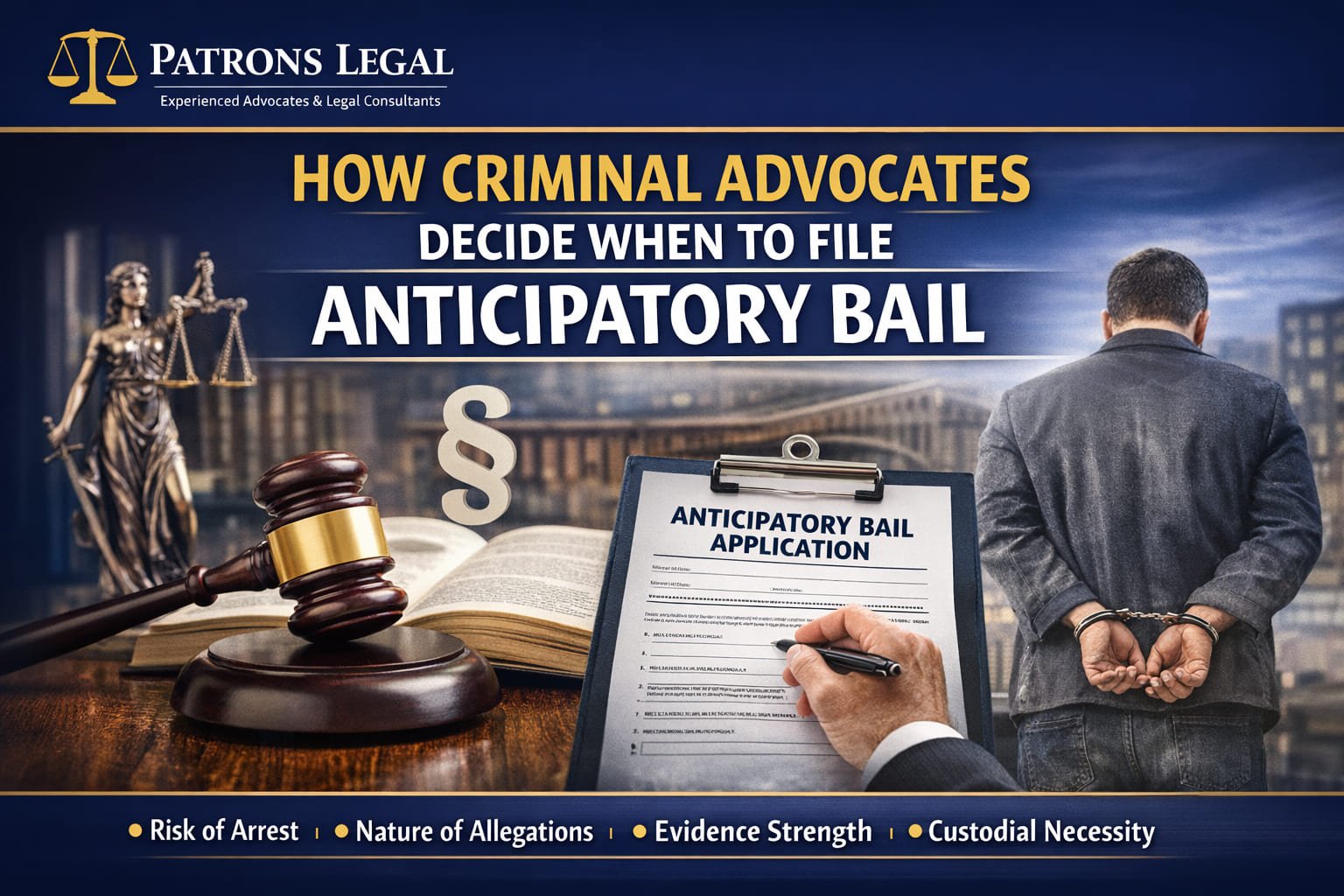Bail is a fundamental right of an accused person in India, ensuring their liberty until proven guilty. The legal framework governing bail is enshrined in the Code of Criminal Procedure (CrPC) 1973, along with various judicial precedents that shape its application. Understanding bail laws in India is essential for anyone facing criminal charges, as well as their families and legal representatives. This comprehensive guide, curated by expert bail lawyers in Delhi, delves into the types of bail, legal provisions, and the role of bail advocates in securing relief for the accused.
What is Bail?
Bail is a legal mechanism that allows a person accused of a crime to be released from custody, subject to certain conditions, until their trial is concluded. It is a temporary release granted by the court, ensuring that the accused remains available for legal proceedings while protecting their fundamental rights.
Types of Bail in India
Indian law categorizes bail into different types, depending on the nature of the offense and the stage of the legal process:
1. Regular Bail
Regular bail is granted to a person who has been arrested and is in police or judicial custody. The accused can file for bail under Sections 437 and 439 of the Code of Criminal Procedure (CrPC). The court considers factors such as the severity of the offense, past criminal records, and the likelihood of the accused fleeing justice before granting bail.
2. Anticipatory Bail
Anticipatory bail, under Section 438 of the CrPC, is a preventive measure allowing individuals to seek bail before arrest. This provision is crucial for those who fear being falsely implicated in a criminal case. Bail Lawyers in Delhi often assist clients in filing anticipatory bail applications, ensuring they do not face undue harassment by law enforcement.
3. Interim Bail
Interim bail is a temporary relief granted for a short duration while the main bail application is under consideration. It prevents unnecessary detention and provides the accused with time to seek legal recourse.
4. Default Bail
Also known as Statutory Bail, default bail is granted when the investigating agency fails to complete the investigation within the prescribed period— 60 days for minor offenses and 90 days for serious offenses—as per Section 167(2) of the CrPC. The accused becomes entitled to bail as a matter of right.
Legal Provisions Governing Bail in India
1. The Code of Criminal Procedure, 1973
The CrPC lays down the procedural framework for granting bail. Key sections include:
- Section 436: Bail in bailable offenses
- Section 437: Bail in non-bailable offenses
- Section 438: Anticipatory bail
- Section 439: Special powers of High Courts and Sessions Courts in granting bail
2. Indian Penal Code (IPC)
The nature of the offense under the IPC determines whether bail can be granted. Generally, bailable offenses include minor crimes like defamation or public nuisance, while non-bailable offenses include serious crimes like murder, rape, or terrorism.
3. Constitutional Provisions
Article 21 of the Constitution ensures that no person shall be deprived of their life or personal liberty except by the due process of law. Bail provisions uphold this constitutional right by preventing arbitrary detention.
Factors Considered by Courts While Granting Bail
The judiciary assesses multiple factors before deciding on bail applications:
- Nature and gravity of the offense
- Evidence against the accused
- Past criminal record of the accused
- Likelihood of tampering with evidence or influencing witnesses
- Possibility of the accused fleeing justice
- Health, age, and other humanitarian considerations
Procedure for Filing a Bail Application
Bail applications must be filed before the appropriate court, depending on the severity of the offense:
- For bailable offenses, the accused can approach the Magistrate’s Court.
- For non-bailable offenses, the accused must approach the Sessions Court or High Court with the help of experienced bail lawyers in Delhi.
- For anticipatory bail, the application is filed before the Sessions Court or High Court before the arrest.
The court may impose conditions such as surrendering passports, appearing before the police regularly, or furnishing sureties before granting bail.
Role of Bail Lawyers in Delhi
Bail cases require expertise in criminal law, and skilled bail lawyers play a crucial role in securing relief for the accused. Their responsibilities include:
- Drafting and filing bail applications
- Presenting legal arguments in court
- Ensuring that constitutional rights are protected
- Gathering evidence to support the bail plea
- Advising clients on legal options and compliance with bail conditions
Experienced bail lawyers can significantly improve the chances of bail approval by presenting strong legal arguments and mitigating concerns raised by the prosecution.
Conclusion
Bail laws in India serve as a safeguard against wrongful incarceration while ensuring that justice is upheld. Whether seeking anticipatory bail, regular bail, or default bail, having the right legal representation is crucial. Bail lawyers in Delhi specialize in navigating complex legal procedures, ensuring the best possible outcome for their clients. If you or someone you know is facing legal proceedings, consulting an experienced bail lawyer can make a significant difference in securing legal relief and protecting fundamental rights.
For expert legal assistance, consult Patrons Legal, a leading law firm specializing in bail matters, criminal defense, and litigation in Delhi.








Leave a Reply